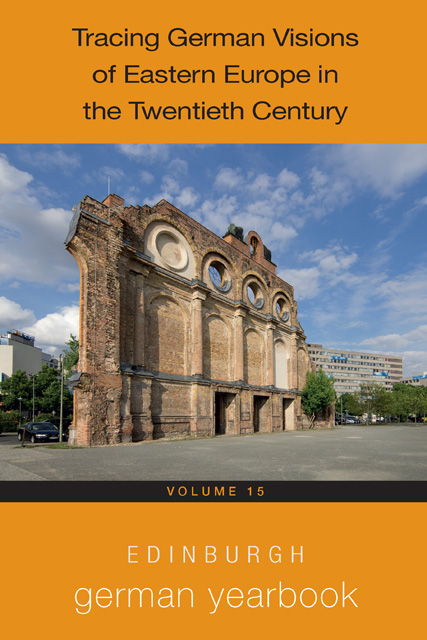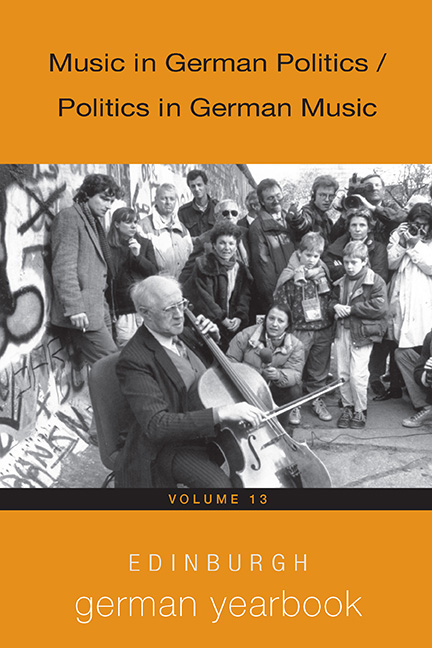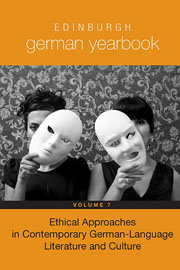14 results in Edinburgh German Yearbook

Edinburgh German Yearbook 2
- Masculinity and German Culture
-
- Published by:
- Boydell & Brewer
- Published online:
- 07 March 2023
- Print publication:
- 01 October 2008

Edinburgh German Yearbook 4
- Disability in German Literature, Film, and Theater
-
- Published by:
- Boydell & Brewer
- Published online:
- 02 March 2023
- Print publication:
- 03 October 2010

Edinburgh German Yearbook 3
- Contested Legacies: Constructions of Cultural Heritage in the GDR
-
- Published by:
- Boydell & Brewer
- Published online:
- 28 February 2023
- Print publication:
- 01 October 2009

Edinburgh German Yearbook 8
- New Literary and Linguistic Perspectives on the German Language, National Socialism, and the Shoah
-
- Published by:
- Boydell & Brewer
- Published online:
- 24 February 2023
- Print publication:
- 28 November 2014

Edinburgh German Yearbook 5
- Brecht and the GDR: Politics, Culture, Posterity
-
- Published by:
- Boydell & Brewer
- Published online:
- 10 February 2023
- Print publication:
- 17 October 2011

Edinburgh German Yearbook 15
- Tracing German Visions of Eastern Europe in the Twentieth Century
-
- Published by:
- Boydell & Brewer
- Published online:
- 11 January 2023
- Print publication:
- 20 September 2022

Edinburgh German Yearbook 13
- Music in German Politics/Politics in German Music
-
- Published by:
- Boydell & Brewer
- Published online:
- 26 May 2022
- Print publication:
- 11 January 2022

Edinburgh German Yearbook 9
- Archive and Memory in German Literature and Visual Culture
-
- Published by:
- Boydell & Brewer
- Published online:
- 21 May 2021
- Print publication:
- 01 November 2015

Politics and Culture in Germany and Austria Today
- Edinburgh German Yearbook 14
-
- Published by:
- Boydell & Brewer
- Published online:
- 06 April 2021
- Print publication:
- 15 April 2021

Edinburgh German Yearbook 12
- Repopulating the Eighteenth Century: Second-Tier Writing in the German Enlightenment
-
- Published by:
- Boydell & Brewer
- Published online:
- 21 June 2019
- Print publication:
- 29 November 2018

Edinburgh German Yearbook 10
- Queering German Culture
-
- Published by:
- Boydell & Brewer
- Published online:
- 07 July 2018
- Print publication:
- 01 May 2018

Edinburgh German Yearbook 7
- Ethical Approaches in Contemporary German-Language Literature and Culture
-
- Published by:
- Boydell & Brewer
- Published online:
- 05 December 2013
- Print publication:
- 01 November 2013

Sadness and Melancholy in German-Language Literature and Culture
-
- Published by:
- Boydell & Brewer
- Published online:
- 05 April 2013
- Print publication:
- 03 December 2012

Edinburgh German Yearbook 1
- Cultural Exchange in German Literature
-
- Published by:
- Boydell & Brewer
- Published online:
- 05 February 2013
- Print publication:
- 02 October 2007

